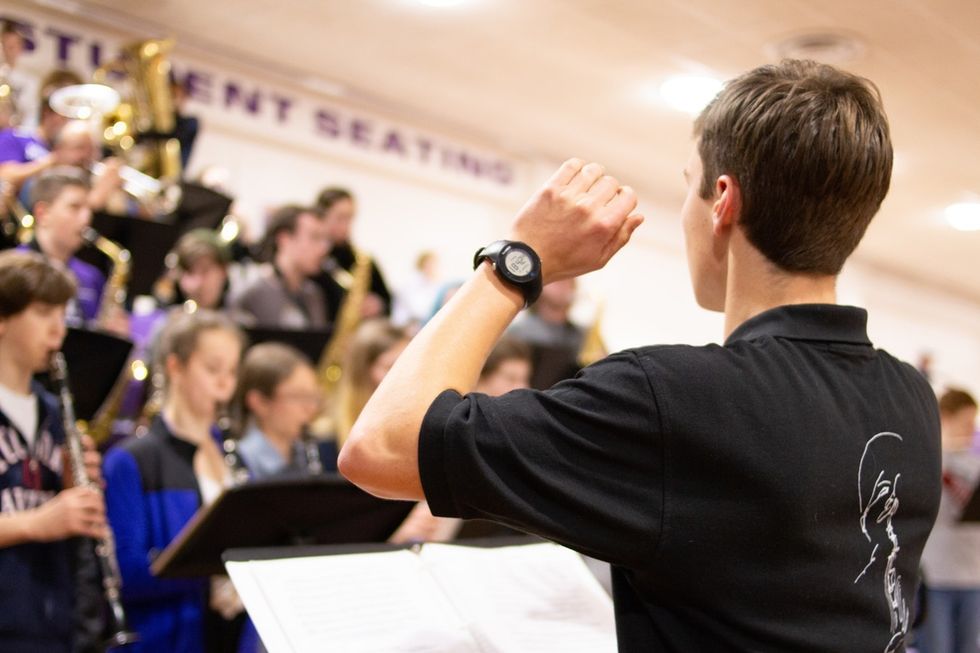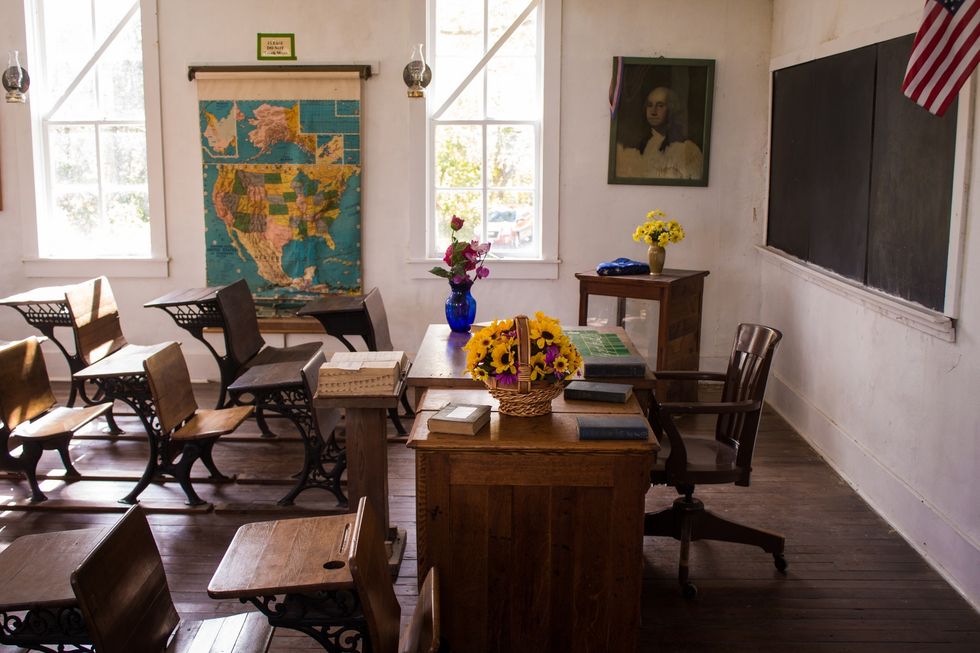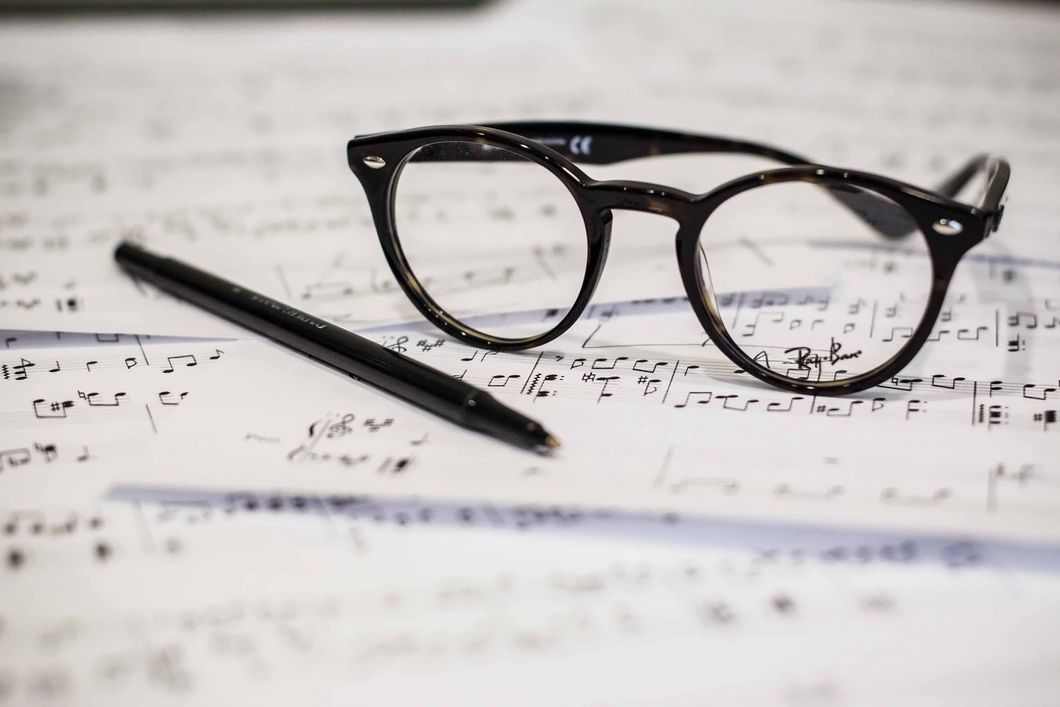We all know college flies by, and before you know it, you're in your cap and gown wondering what the next step will be. After being in school for roughly 17 years, we're so used to just showing up to class and taking notes. However, what do we do after that? For future music teachers, we want to end up back in the classroom on the other end, leading ensembles instead of playing along and teaching new students instead of acting like one yourself. Although countless people have done it before, the transition seems daunting to new music educators. So, who better to help them than those who have been there and done it before? Here is my interview with eight music teachers, in the hopes of helping soon-to-be music teachers.
1. What is your name and current teaching position?

Jessica Tosti- Central Bucks West HS and Lenape MS Orchestra Director
Jill Simpkins- General Music Teacher/Choir, Bridge Valley Elementary (Central Bucks School District)
Patricia Powell- Assistant Professor of Piano and Piano Pedagogy
Julia A. Swanson- Elementary General Music Educator at Paradise and Salisbury Elementary Schools in the Pequea Valley School District (Lancaster County, PA)
Scott Hensil- Orchestra Director: Central Bucks High School South
Jaime Rogers- Lenape Middle School Director of Vocal Music
Carol Kalbach- Retired after teaching public school music for 28 years, also taught private piano
Henry Grabb- Professor of Applied Music- oboe
2. Where did you get your degree?

Mrs. Tosti- B.M. & M.M. from Temple University
Mrs. Simpkins- Kutztown University
Dr. Powell- BM Performance University of Florida; MA Oxford University MA, Music History & Theory; MM Performance University of Southern California (USC), Los Angeles; DMA, Catholic University
Mrs. Swanson- BS and MM from West Chester University
Mr. Hensil- Transferred from Indianan University (Bloomington). Bachelor Degree: Temple University. Graduate Degree: West Chester University of PA.
Mrs. Rogers- Ithaca College- Bmus, Wilkes University- Masters in Educational Technology
Mrs. Kalbach- West Chester University B.S. Music Ed. Cabrini MM in elementary Ed
Dr. Grabb- University of Central Florida, Northwestern University, and Florida State University3. Why did you become a music teacher?

Mrs. Tosti- I always knew that I wanted to be a professional musician. Initially, I wanted to solely major in performance. However, I knew that I didn't want to lock myself in a practice room for hours on end. I decided to double-major in Music Ed and Violin Performance so that I could study both facets of music. The prospect of teaching and playing was very exciting.
Mrs. Simpkins- Obviously, my love for kids and passion for music led me to a career in music education. In high school, I had the change to be the captain of our pit percussion section where I was able to help students who knew nothing about music to guide them to performing with the band. This made me realize my passion for the beginning stages of learning music.
Dr. Powell- I enjoy the interaction and the dialogue with the students.
Mrs. Swanson- I became a music teacher because I have a love for children and music. My elementary church choir director was an incredible role model and inspired me to share music with others through education.
Mr. Hensil- Music, the arts, and creativity were always very important to me. Ultimately, I think the universe steers you in the direction to find your personal legend. My message came to be through a story my grandfather shared with me and inspired me to want to help other people find the joy and power of Music in their lives.
Mrs. Rogers- Originally I thought it would be a great back-up if performing didn't work out. Then when I did my methods classes and student teaching I really fell in love with it and changed my career goals.
Mrs. Kalbach- I wanted to be a music teacher since fourth grade.
Dr. Grabb- Because I love music and teaching
4. What is one thing you wish you had done more of in college to better prepare for your career?

Mrs. Tosti- Taken piano lessons PRIOR to college.
Mrs. Simpkins- In college, I wish I would have done a more thorough job of collecting resources for when I am in the classroom. I was fortunate in that the position I walked into had a TON of resources for me, but sometimes that is not the case. If the teacher I was in for was not so organized, I would have had to spend a lot more time researching and finding resources.
Dr. Powell- More time learning languages.
Mrs. Swanson- I wish we would have had classes on Differentiation for students with IEP's, GIEP's, emotional support, autistic support, and ESL.
Mr. Hensil- Developed a better understanding of the kind of work ethic that success in a teaching job requires. It can be a brutal day after day after day fight to achieve success and have an impact on the students in your care. You will fight and after you will lose, but you have to be willing to fight the good fight EVERY single day. School offers people the opportunity to develop that, but very few students ACTUALLY do that kind of work. I wish I had. Shortcuts in high school and college just put you farther behind in your ACTUAL pursuit of success in life. I wish I hadn't taken as many shortcuts earlier in my life.
Mrs. Rogers- Spent more time observing great programs.
Mrs. Kalbach- WCU did an outstanding job of preparing me for my teaching career. I ended up teaching in three states and always secured the teaching position interviewed for.
Dr. Grabb- Made opportunities to work with other oboists besides my undergraduate teacher.
5. What is one skill you wish you could have learned more about in school?

Mrs. Tosti- Classes in communication, organization, bookkeeping; the non-musical parts of our job.
Mrs. Simpkins- Classroom management, special education training in the music classroom
Dr. Powell- Cello & Strings
Mrs. Swanson- I wish I could have taken a choral methods class. At the time, instrumental majors were only required to take Instrumental Methods.
Mr. Hensil- Rehearsing ensembles and actual TEACHING skills. It is funny, you work on conducting and performing… but what you spend most of your time doing as a secondary teacher is rehearsing. I think colleges need to find more time for Music Ed students in front of actual ensembles giving feedback and a strategy for progress.
Mrs. Rogers- How to create good assessments and grading. I'm terrible at grading.
Mrs. Kalbach- Special needs students
6. What was the most useful and/or useless class in college?

Mrs. Tosti- Most useful was teaching Instrument Methods class, my private violin lessons, and Orchestra ensemble. Least useful was having to take so many Gen Ed. Classes and taking Upper Strings Method class (learning violin and viola).
Mrs. Simpkins- All of the methods courses really gave practical tips to succeeding in the classroom (Choral Methods, Instrumental Methods, Elementary Methods). Also, all of the instrument performance courses (learning how to play all of the instruments). Most useless were all of the prereqs (which I realize are required). Many of them I don't use now (for example, teaching elementary math, etc).
Dr. Powell- Writing is so important
Mrs. Swanson- Elementary Methods was the most useful class, and general ed. Math was the most useless.
Mr. Hensil- Graduate school class- don't remember the name… completely useless, involved studying hypothetical situations a music teacher might have to deal with and different ways of handling it. In theory, a good concept for a course. The way the course was "taught" was useless. Professor simply had all the students read a chapter and "present" it to the class. Very little useful discussion or sharing of useful experiences, even after each presentation. The ONLY good thing I got from the class was to learn NOT to teach in the manner of this professor. Professor was lazy and didn't seem to want to offer guidance or instruction of any kind.
Mrs. Rogers- This is tough because I graduated a long time ago. I suppose my methods classes and also watching and learning from ensemble conductors.
Mrs. Kalbach- My private piano lessons as my prof modeled the learning process over and over
7. Do you still use any of your college textbooks?

Mrs. Tosti- Yes
Mrs. Simpkins- I haven't used any since I started teaching (but this is only my second year, so maybe one day!).
Dr. Powell- French
Mrs. Swanson- Yes, some of my elementary methods books.
Mr. Hensil- A few have provided useful over the years. I based my own AP theory text from my first undergrad Music Theory book from Jacobs School of Music- Indiana Univ. Most texts, not so much. While resources are good, books don't teach. Sometimes teachers get obsessed with finding books and methods to "teach" the kids…. But I find that TEACHERS teach kids. Don't become too obsessed with the book… be obsessed with the TEACHING.
Mrs. Rogers- Yes. The book on Diction still comes in handy when I have a song in French (not my strongest language).
Mrs. Kalbach- No not any textbooks however, I do use my music.
Dr. Grabb- Yes- I still use a rhythm book from undergraduate- Studies in Time Division by Larry Teal
8. What is something that should be on every new teacher's resume?

Mrs. Tosti- Teaching experience of some kind
Mrs. Simpkins- I think that some sort of musical experience outside of "school" is helpful to you as a teacher and something that school districts are looking for. Whether it's working with a church choir, doing a summer music camp, or teaching private lessons, that shows that you are invested in kids and music career.
Dr. Powell- Their passion for teaching
Mrs. Swanson- Each new teacher should have some type of work with students, such as a camp counselor or working at the YMCA with kids. Teaching lessons at a community music school or volunteering with a marching band could also be helpful.
Mr. Hensil- Perhaps time teaching private lessons to students. Any kind of experience in teaching actual students would be good. We often become a much better musician with better fundamentals when we start trying to guide other people to discover those same fundamentals.
Mrs. Rogers- Hopefully some kind of pre-service experience. Working at camps or giving lessons. This is a great experience that helps to build confidence as a teacher.
Mrs. Kalbach- Make sure everything is spelled correctly!
9. How many schools did you apply to after graduating?

Mrs. Tosti- I applied to a couple other districts around the same time as CB, but got the CB job before interviewing elsewhere. So I was very lucky- CB was my first interview and I was hired!
Mrs. Simpkins- I don't know the exact number because it didn't all happen at the same time, but I'd say somewhere between 10-15.
Dr. Powell- Just one application after each degree.
Mrs. Swanson- I do not remember how many schools. I just remember how long it took to type (yes, with a typewriter) each individual application and accompanying essays.
Mr. Hensil- I don't remember exactly, I guess it was about 5.
Mrs. Rogers- I don't remember. I think it was a lot.
Mrs. Kalbach- I don't remember. I think two.
Dr. Grabb- I was asked to join the faculty of Stetson University at age 23 as a part-time oboe teacher, but applied for many jobs before landing tenure track positions.
10. How did you decide where you wanted to apply for teaching positions?

Mrs. Tosti- I knew that I wanted to stay in the Philadelphia area. I didn't know about CB per se, but I knew that Bucks County had very good school districts.
Mrs. Simpkins- Most of my decisions were based on location. I applied to schools within an hour of where I live. I ended up in a school an hour away from where I live currently and I love my school. I also looked at factors like urban schools vs. suburban, how big the district is, public school vs. private, etc.
Dr. Powell- I got very lucky: it fell in my lap.
Mrs. Swanson- I applied to any school that had an opening in Music, even out of state schools.
Mr. Hensil- At first, it was almost anywhere that posted a music job. I wanted to stay in the Southeastern PA region. My first job was School District of Lancaster for two years and then CB for the last twenty. With Music teaching jobs, sometimes you have to be willing to go TO the job.
Mrs. Rogers- I applied everywhere with open positions in PA, NJ, and NY since that is where I was certified.
Mrs. Kalbach- I got married and moved to Ohio.
Dr. Grabb- For college professors, you go where the work is- no matter where.
11. How did you decide which age you wanted to teach?

Mrs. Tosti- I knew that secondary was my preference, though I did not student teach at the MS level (only elementary and high school). At the time, I felt like I connected more with middle and high schoolers, hence my preference to teach at the secondary level.
Mrs. Simpkins- In my years at Kutztown, we were required to do a lot of observation and hands-on experience in all different levels (elementary, secondary) and areas (urban, suburban, rural) as well as working with ensembles at the college level (running rehearsals, etc.). This allowed me to get an idea of what areas I preferred. I realized I was more comfortable and passionate with elementary level but I also had a successful student teaching experience in middle school. This led me to apply to both elementary and middle school positions while glossing over high school positions.
Dr. Powell- All ages, including adults. I think it's because I enjoy listening to others. I like to hear other ideas, other than just my own!
Mrs. Swanson- Music education positions were difficult to find when I graduated. I applied to all levels in hopes of finding something. I ended up getting a long term sub position in an elementary school for my first year and a half, and luckily, I thoroughly enjoyed that age level and have taught K-5 for 29 years.
Mr. Hensil- For me, I always wanted HS and that is where I started. When I switched school districts to CB I taught Middle and Elementary at first and eventually moved up to HS again after a few years.
Mrs. Rogers- I didn't. It was the job I got. Grades 5-12, general, vocal. I actually thought I would be a good elementary teacher but that is not what I got. Now I really love middle and high school kids.
Mrs. Kalbach- I always wanted to teach elementary age. However, I very much enjoyed older private piano students.
Dr. Grabb- From the moment I started college, I knew I didn't want to teach anything but college.
12. Have you ever taught outside of your preferred instrument/ instrument types? (For example, if your preferred instrument was the violin and you taught a choir class). What effect did this have on you?

Mrs. Tosti- Yes- this was a challenge, but a good one. I've taught Choir, General Music, PEN, and even remedial math class!
Mrs. Simpkins- Yes! A lot of times, you don't get a choice on what "extras" you have to teach. My first year of teaching I had to teach beginning strings (4th grade). I had 2 different classes a week, one of violins and one of violas. At first, it was overwhelming because I didn't feel prepared, but once I got started I had a blast. I was only a little bit ahead of the kids but it ended up being a positive learning experience for me and the kids!
Dr. Powell- Not really- I like to try everything!
Mrs. Swanson- I was an instrumental major in college, but I also sang in select choirs, so having an elementary school chorus was not intimidating. I just wish I would have had more of a background in choral methods. After teaching general music for 23 years, I was asked to teach woodwind lessons two days a week. I spent the summer beforehand practicing and reviewing the fingerings. I only taught the lessons for one year, but I discovered how you could get to know your students on a different level when you worked with them in a small group setting.
Mr. Hensil- I have always had at least SOME orchestra in my schedule. I have taught all sorts of other music classes though, general music, guitar, keyboard, theory, AP theory, music technology, etc.
Mrs. Rogers- I have always taught choir.
Mrs. Kalbach- One year I had to teach three sections of violin 😱 I felt unqualified to teach this instrument because all I had was one year of lessons in college.
Dr. Grabb- Yes, I've taught a number of things I am not qualified to teach. I don't like it, and almost didn't get my current position because I refused to teach conducting classes.
13. Have you ever taught outside of your preferred age? Did this change your preferences, or did they stay the same?

Mrs. Tosti- I didn't student teach in MS, so I wasn't familiar with the age group when CB hired me. But I LOVE it! Teaching HS has always been a dream of mine and I am excited to be at CB West this year. It's challenging but I love it too!
Mrs. Simpkins- I currently teach elementary school, which is what I was hoping for. I did student teach middle school which I was honestly nervous about. I ended up really liking middle school and could see myself teaching middle school if needed. I still prefer elementary but I know that I could be successful in middle school.
Dr. Powell- Not really.
Mrs. Swanson- I spent many summers co-teaching a choral music camp at the University of Delaware for grades 4-8. I really enjoyed the middle school age group, but of course, all of those students wanted to be there and willfully participated.
Mr. Hensil- Yes, and no, it did not change my preference. There is definitely a sweet spot for every teacher in the age that they work best with. For me, it seems like HS.
Mrs. Rogers- Coming to Middle School was a big change after 5 years of teaching high school. After adjusting I really grew to love middle school kids.
Mrs. Kalbach- Worked with older students one on one and enjoyed them very much.
Dr. Grabb- No.
14. What is the most challenging part of being a music teacher?

Mrs. Tosti- Balance in all forms. Balancing time, balancing opportunities/overscheduling.
Mrs. Simpkins- I would say that the most challenging part of being a music teacher so far is just being able to jump in and adapt to whatever your school needs. Each school is different and has different needs, just like the students. My first year of teaching, I was split between 2 schools and this year I am at a totally new building. Being flexible and being able to quickly figure out what the needs are is crucial.
Dr. Powell- Grading! However, assessing is very helpful to the teacher and students!
Mrs. Swanson- I find the most challenging part is building relationships with my students when I only see them once a week for 40 minutes and I teach 850 students a week.
Mr. Hensil- HA… So much! This may seem odd, but it is the battle that you seem to have with EVERYBODY to get people to see the worth of Music. Parents, students, other teachers, administration, etc. We constantly have to justify WHY Music is good for people and people seem to instinctively rally against this concept. I defend music in some way almost every single day… and around course selection time, I do it about 30 times per day. The number of times you hear "Timmy LOVES music, but he can't fit it in his schedule because he needs to take 48 academic classes." When you hear the other academic teachers say, "Well music is NICE, but let's be serious, what they NEED is Math." When you hear from a principal "Yeah but you can't give that student a C for skipping the orchestra concert and dress rehearsal, he may be valedictorian someday and you don't want MUSIC to keep him from that" (last one was a direct quote from an MS principal when a student in orchestra skipped both the Dress rehearsal and concert for unexcused reasons and the principal got in an argument with me about whether I could give him a grade lower than an A). You have to be willing to FIGHT for the worth of Music EVERY single day.
Mrs. Rogers- Balancing work and home life.
Mrs. Kalbach- Teaching without a room on a cart.
Dr. Grabb- Dealing with students who are not motivated.
15. In a typical school day, do you teach other classes besides your main music class (i.e. music theory, music production, etc.)?

Mrs. Tosti- Not this year, but I have in the past.
Mrs. Simpkins- Other than general music, I have a choir rehearsal once a week before school (7:45-8:30). Also, our school is the Autistic Support feeder for the district. I have 5 classes a week of just students with autism. While it is still a general music class, it is a very different environment than a regular education general music class.
Dr. Powell- Class piano, keyboard ensemble, Pedagogy.
Mrs. Swanson- I have two Choruses and two Orff and Drum Ensembles (one at each school).
Mr. Hensil- Yes, theory, technology, and multiple disability music class on an a/b schedule.
Mrs. Rogers- I teach Exploratory Music and PEN
Mrs. Kalbach- Choir, and of course all levels K to sixth grade.
Dr. Grabb- No- just flute classes.
16. What techniques have you found most beneficial in the classroom or during outside practice?

Mrs. Tosti- Always starting with technique building- scales, arpeggios, chorales, etc. Identifying "need to practice" excerpts for each instrument in each piece is helpful. I use sightreading factory which really helps with rhythm and sightreading skills.
Mrs. Simpkins- Listen first, so they know the general idea. Practice in small chunks. Repeat repeat repeat. Have fun!!
Dr. Powell- Being a good listener for the students: moving is very helpful.
Mrs. Swanson- Using proper vocal techniques, such as vocal warmups and good breath support. I now teach with a microphone to help protect my voice.
Mr. Hensil- Complicated question. Entire courses could be taught. I think Binary Rhythm reading is a substantial one. For practice/rehearsal techniques, I think the focus on awareness and habits is essential to any musician/ music student. Ultimately, the technique is secondary to the recognition of a problem (for awareness) and what can be done to avoid the problem from happening again (building habits). Also, I guess study the circle of 4ths (4ths, not 5ths, as it is important to have a V to I relationship built into the system from key to key clockwise).
Mrs. Rogers- Consistent classroom routine and always keeping good/healthy vocal production at the forefront of everything we do.
Mrs. Kalbach- Always meet the class at the door. Have a beginning routine. Ex: Question on the board, rhythm exercise, goals for the day/period outlined and visible.
17. Do you encourage students to sectionalize when learning new pieces?

Mrs. Tosti- Absolutely
Mrs. Simpkins- In general, yes. It's always a good idea to take chunks of a piece to focus on or create small groups to rehearse. Depending on how many kids you have or how much help you are receiving, this may be possible in a large group setting. Maybe not. In my choir, there are 110 kids and just me so we rarely break up into small groups to rehearse. We often will take one voice part at a time or focus on a small chunk of the piece.
Dr. Powell- YES
Mrs. Swanson- Yes, it is important for the students to understand how there are patterns and sequences in music. Once they find the patterns, it makes the music easier to learn.
Mr. Hensil- I suppose you mean like "chunking". It often will depend on the piece. As a general rule, segmenting the music into smaller more manageable sections with specific focus points is key.
Mrs. Rogers- Yes
Mrs. Kalbach- If you mean work in small sections, yes!
Dr. Grabb- Yes.
18. How can movement in the music classroom positively affect the learning experience?

Mrs. Tosti- Changing seating after each concert allows students to make connections (musically and socially) with others.
Mrs. Simpkins- One of the most important jobs of an elementary music educator is to instill a love of music in kids. If kids are moving and dancing and singing, they are engaged and that love of music will grow. The opportunities for movement are endless- dancing, motions, playing instruments, musical gym (cardio drumming, etc.- SO fun!- and also a way to collaborate with gym teachers).
Dr. Powell- You and the students feel freer.
Mrs. Swanson- Movement is essential in the music classroom. When the students are able to move beat, rhythms, and patterns with their bodies, you know that they have internalized the learning and it will make the performance and the reading of the music much easier.
Mr. Hensil- From a pedagogy standpoint, some people learn things better through physical action. So some students better understand pulse or division because of physical actions/movements as an example. For a kinesthetic learner, the intellectual concept may not be as clear as a concept taught with a physical component.
Mrs. Rogers- It wakes up the body and therefore the mind. Movement with music is natural. Using movement gives students more ways (synapses) to access the information later. Great for kinesthetic learners and pretty much all middle school boys.
Mrs. Kalbach- You have to have movement in classroom music. Students only should sit their age. Ex: First grade should have a new activity every seven minutes. And moved to a new location doing it. Always in the middle of a 40-minute class students need to get up and do movement activity.
19. How do you still try to learn in the classroom?

Mrs. Tosti- There is something to be learned from everyone in a classroom. Sometimes it's easy to get caught up in "being the teacher" but everyone brings different experiences to the group.
Mrs. Simpkins- I feel like you have to treat each day as an opportunity to learn. First of all, our kids need to see us modeling how to learn. They will notice! Secondly, we don't know everything and we need to be actively pursuing the skills and answers we don't yet have. I find that collaborating with other music teachers in my department is a great place to start. They often have the answers I'm looking for (whether it's resources, materials, techniques, etc.)
Dr. Powell- Try different activities in any class, especially pedagogy. I stay current with new ideas that may benefit the students and my teaching.
Mrs. Swanson- I continue to attend workshops and conferences to learn from other music educators and help refresh my own teaching.
Mr. Hensil- Every day in the classroom teaches me new things. If you aren't learning every day, then you aren't paying attention and are probably just "phoning it in." It is funny, you spend years developing techniques and learning to teach a concept, and then you find a class that for some reason is completely unable/unwilling/unready to learn that material/skill/etc. from you in the manner you provided. I can't tell you the number of times a lesson fails in one class for the first time in years and you have no idea why… so you go on a mission to figure out what happened, why, and how can I have better control of it in the future.
Mrs. Rogers- In the classroom I ask lots of questions of my students. I also belong to several music teacher and choral director social media groups that are a great resource for new ideas and solving problems.
Mrs. Kalbach- One never stops learning. I loved going to workshops, concerts, graduate classes, staff development, etc.
Dr. Grabb- I am always trying new ideas to see what clicks with students.
20. How does reflection effectively guide your teaching?

Mrs. Tosti- I reflect, formally and informally, all of the time. I give students reflections following each concert, with the purpose of goal setting moving forward and to give them an opportunity to offer suggestions.
Mrs. Simpkins- Reflection is a huge part of teaching. In order to do the best for your kids, you need to accurately asses how your lesson went, if the kids understood what they should, if your teaching techniques were effective, etc. Administrators often look for the reflection piece of your lessons!
Dr. Powell- It is the key to understanding how the students respond and learn; give the students ample experiences.
Mrs. Swanson- Reflection is probably the most important guide for teaching. If you do not reflect on your lesson, you will not be able to customize the learning for your students. Even after 29 years of teaching, I am still adjusting my lessons to fit the needs of each individual class.
Mr. Hensil- NO learning takes place without reflection. As I say in Orchestra class frequently, you don't get better while you are playing, you get better in between the attempts when you think and reflect. I also, of course, gave you white sheets as a reflection tool. It allows students to focus their thoughts and also bridge a communication gap between teacher and student so that I can teach students in a more informed way.
Mrs. Rogers- I am always reflecting on how I could have taught something better and changing my approach. I think that this is a very natural process for a musician.
Mrs. Kalbach- Always use reflection to modify and adjust your lesson.
Dr. Grabb- A good teacher is always reflecting on what is going on with his or her students. Sometimes new ideas come to me for a student days after a lesson.
21. How do you deal with inclusion in the ensemble setting?

Mrs. Tosti- Believe it or not, I haven't experienced this.
Mrs. Simpkins- Each and every kid deserves a chance to perform in an ensemble if they want to. It is our job as educators to provide them with the best experience possible. This may mean helping a student with a physical disability choose an instrument that will best suit them. Maybe it means allowing a student with behavior or emotional needs into the choir. Maybe it looks like pairing them up with a student or two who can help them if they need it. It will look different for each kid, but it's our job to be inclusive and share our love of music with everyone!
Dr. Powell- You have to pay attention and make sure that you are not intentionally biased. Make sure that all students have a say in the discussion.
Mrs. Swanson- Inclusion in the ensemble setting is not a big deal at my schools. I have so many learners who are kind and helpful, and they will partner with any learner who needs extra help. The students are of much more help than the paraprofessionals that often accompany the inclusion student.
Mr. Hensil- Depending on the situation, you may see more or less about inclusion as a music teacher. Depending on the level, ensemble, etc. So a choir teacher may find a need to focus on inclusion for their ensemble more than a typical orchestra teacher. Ultimately, it is our job to teach all and any students who are in our courses. So sometimes you need to work to find ways to make something work in your classroom that isn't normal or standard.
Mrs. Rogers- It really depends on the individual students. You have to meet them where they are. Sometimes you are able to provide additional support for them to be able to have the same outcomes as the rest of the class. Sometimes you have to create an alternative assignment/outcome. It is important to communicate honestly and frankly with their parents and caseworker about how things are going. Ask for help.
Mrs. Kalbach- Sometimes you need an aid, or student helper assigned to the student. You might solve two problems at once if you choose a discipline problem child to be a special friend to the inclusion child.
22. How does an effective discipline strategy help guide effective classes?

Mrs. Tosti- I'd say curtailing talking is the most frequent "disciplinary offense." By keeping instruction moving and not catering to their chattiness, it makes for a better rehearsal class.
Mrs. Simpkins- I have found that when kids know your expectations, it lends itself to better learning, fewer distractions/interruptions, and more fun! When the kids know what you expect of them, they rise to your standards and this ultimately creates a safe and fun learning environment.
Dr. Powell-
Mrs. Swanson- If there is no effective disciplinary strategy, then little to no learning will occur in your classes. One of the biggest mistakes I made as a first-year teacher was putting all of my focus on the lesson plans and teaching the lessons, instead of taking the time to really get to know students and their names. Sometimes all it takes is looking at a student and saying their name during class to pull that student back into the learning.
Mr. Hensil- Sometimes, I feel the discipline techniques you read about for classroom management are misleading or difficult to implement in the reality of a teaching situation. Ultimately, experience in a classroom and figuring out HOW to predict and react to scenarios through many years of trial and error is the main thing that will enable success in classroom management to enable effective classes. Yes, you have to have an effective classroom management skill set in place to have effective classrooms, but I feel that largely comes from the students believing in their teacher as a calm and assertive leader. When students do not believe in their teacher, things fall apart. Why do students not believe? That is a much bigger topic, maybe lost trust, maybe sensing fear, maybe not being able to envision success as a result of the current techniques, etc. If there is no trust between student/teacher, it falls apart and effective classes never happen.
Mrs. Rogers- The best discipline strategy is setting up clear expectations and routines. When students know what to expect from me, where to find things, what they are expected to do in class they are much more comfortable and there are very few discipline issues. Students must know you care about them. When there is a problem, always treat your students with dignity. Don't embarrass them in front of their peers. Take them in the hall to talk. "Don't get furious, get curious." Find out the root of the problem. Support them.
Mrs. Kalbach- Out of a lot of tricks up your sleeve and different ways of dealing with the same problem to have an effective learning environment.
23. How often do you write/ change lesson plans?

Mrs. Tosti- I don't write formal lesson plans but I do have a rehearsal map of the classes leading up to each concert. If I were to have formal lesson plans, there would need to be given as things do change based on student needs.
Mrs. Simpkins- I write plans each week. So I'll write a new plan for each grade level once a week. I label my plans by number (LP #1, etc.) and that way it's easy to keep track of with snow days, days off, etc.
Dr. Powell- Every week in Pedagogy class.
Mrs. Swanson- I write my plans weekly, but it is often daily that I am making small changes to the plans to fit the needs of the learners in each class. What may have worked with students one year may not work with a different group of students the following year, so each year my lessons look different.
Mr. Hensil- Write: never. I don't write lessons down anymore. I plan in my head and keep a form of mental checkpoints for what I want to do. For me and many experienced teachers, we don't write down, because it actually takes longer to do something that doesn't yield any extra benefit for us anymore. For a new or younger teacher, writing a lesson plan helps to make sure that there are some logic and organization in place. CHANGE: all the time. This is the other reason experienced teachers don't write lesson plans down. As much as I want to predict exactly what my orchestra should work on today, often when the class begins rehearsing a COMPLETELY new and unexpected problem emerges that might not even remotely be in line with my lesson. Should I abandon my lesson than at that point? For me, I will probably divert to the current problem, implement a plan to attack it, then try to steer the class back towards my original goal. Problem with lesson plans, most lesson plans might only be accurate for the class for only a few minutes and once the kids start playing and showing musical problems, I am no longer "on-plan"
Mrs. Rogers- I constantly change plans based on what occurred in the previous lesson.
Mrs. Kalbach- All the time.
24. What do you do when you feel emotional or stressed out during a rehearsal?

Mrs. Tosti- This is a great question. It depends on the emotion I suppose. If it's an emotion I feel is important to address or explain, we talk about it. I've learned that getting angry can't be a frequent occurrence if you want students to be engaged and comfortable.
Mrs. Simpkins- I first try to remind myself that I teach elementary school. If they aren't getting a concept, I try to remember that they're kids, first. Next, I have found that kids really adapt to your mood. If they can sense that you are frustrated, they could easily get upset. If you're having a blast, the kids are most likely to have fun too! Lastly, I remind myself that the most important part of my job is to make sure that my kids leave loving music. If they don't get a concept or a certain part, we'll get it next time!
Dr. Powell- Take a break, and move!!
Mrs. Swanson- I try to take a deep breath and count to 10 in my head before I say anything. Having a sense of humor and cracking a joke can also lighten things up in a rehearsal.
Mr. Hensil- HA! During my career, this has changed. I used to snap pencils out of frustration. Now, I probably just say something sarcastic or passive aggressive and then take a deep reflective breath for myself. Then think about how I want to start again and do it. I remind myself to "fight the good fight" constantly.
Mrs. Rogers- BREATHE. Go home and have a glass of wine with dinner.
Mrs. Kalbach- A good laugh always helps.
Dr. Grabb- It's up to the teacher to keep going no matter what.
25. How do you release the stress of your job outside of school?

Mrs. Tosti- Focusing on my family, listening/playing music that I want to listen to/play (not music I'm teaching or learning for a gig) and horseback riding.
Mrs. Simpkins- I try to make sure that my life has some sort of balance. I make sure that I make time to do the things I like. For me, this means doing my best to get a lot of school work done at school so I don't have to bring a lot of work home. If I do have work to do at home, I make it fun by having a "Starbucks Date" with friends to be productive while having fun!
Dr. Powell- Swimming twice a week, walking.
Mrs. Swanson- I faithfully take exercise classes at the Y every morning before school. I also sing in a semi-professional choir, where I am not in charge, but I am working on music that is challenging for me.
Mr. Hensil- Very important and insightful question. It is SO important to have something outside of music. For a number of years, I tried to relieve stress with Music… but one music is your job, your own music will sometimes just add to the stress. Find something else. Exercise is great. I like doing puzzles or Lego or something like that where my mind can focus on something else. Some people like mindless activity to destress (tv, video games) I like mindful activities, something where I can still create or focus.
Mrs. Rogers- Hmmmmmm. I need to work on this.
Mrs. Kalbach- Exercise/ read
Dr. Grabb- I go to the gym.
26. What has been the most rewarding part of teaching music?

Mrs. Tosti- Making music with others- same as why I started teaching it. It is so rewarding to hear from former students about how what they've learned or experienced in Orchestra has stayed with them. Sometimes it's very small moments that they remember the most! I also love how much service we do within our programs. Teaching students to help and serve others is so important and rewarding.
Mrs. Simpkins- The most rewarding part of being an elementary music teacher is being able to see Kindergarten/1st graders come into your room with little to no music experience/knowledge and see them leave as 6th graders who can read, write, create and perform music. I also find that my Autistic support classes are very rewarding!
Dr. Powell- When a student has a breakthrough!
Mrs. Swanson- One of the most rewarding parts of teaching are the little things that happen in class. When you observe a learner who never shows any emotion in your class, and they suddenly smile during an activity, or when a student sees you in the hallway and tells you they can't wait for the next music class. It is also rewarding when your former students go on to study music in college. I have had some students in high school come back and do internships with me before they go to college. It is amazing what they remember from elementary music class. I also love when former students contact me with a memory they had from their music class.
Mr. Hensil- The times when you can feel every heartbeat in the room sharing the same beat as you won. When your arm-hair raises because the MUSIC makes you feel something that is completely REAL. In a world full fake, you still can't fake REAL. When students WANT to experience great Music, but it hasn't happened yet… but as an experienced director, you know that it WILL happen now that they WANT it. These are some of my favorite feelings.
Mrs. Rogers- Getting to know my students and their families. Getting to be a part of the community. Getting to sing and play all day. It really is the best job.
Mrs. Kalbach- Seeing students succeed.
Dr. Grabb- When students are excited about what they have to learn.
27. Do you have any other recommendations for future music teachers?

Mrs. Tosti- Stay true to your ideals and always remember why you started teaching music. There will be many peaks and valleys, many curveballs, but the successes are beyond rewarding. Be ready to be giving your time but also keep in mind that you don't have to say yes to everything. Ask for help when you need it- you don't have all of the answers. No one does, but more experienced teachers can help you avoid some of the pitfalls.
Mrs. Simpkins- I have found that other teachers are so willing to help! The first couple of years can be overwhelming and tough, but don't be afraid to ask for help! A lot of administrators see that as a good thing!!
Dr. Powell- Improvise more often in lessons- let the students have some stake in the process.
Mrs. Swanson- Do what you love. Take care of yourself and your voice so that you can share your love and knowledge with your students (even if that means wearing a microphone every day). Build relationships with your students and their families. Keep yourself current by continuing to take classes. Join a network of other music educators, such as a local Orff Schulwek or Kodaly chapter. Get involved on the National level, by attending conferences and learning from educators all over the country and the world. Keep current as a professional musician outside of school by joining a community choir or band, or performing in recitals. Remember to find joy in the little accomplishments in your classes each day.
Mr. Hensil- When you start your career, find a person who you admire or trust with more experience than you have and ask LOADS of questions. When you get your first angry parent email… don't respond until you run it by them. Keep doing that for 5 or more years as you gain your footing. You will have days in your first five years of teaching where you will simply put your head down and cry at the end of the day. Keep fighting the good fight. Remember to keep reminding yourself WHY you love Music in the first place. Don't try to do things alone to prove a point, because that is pointless… instead of trying to go it alone, try to stand on the shoulders of Giants. As I taught in orchestra class, remind yourself that YOU MUST BE BETTER THAN ME, so be a sponge and take in ideas from everywhere, empty your cup and keep being willing to learn new ways to think about things, be flexible because the flexible never get "bent out of shape". It will be hard, but it is often the hard things that are most worth doing.
Mrs. Rogers- Ask for help. Asking for help is not a weakness. Get advice. We want to help you. Get to know parents and families- they are your advocates.
Mrs. Kalbach- Have fun with what you love to do. Be respectful of the staff especially make friends with the custodian and the secretary.
Dr. Grabb- You must maintain a positive attitude toward your students, both externally and internally.

















